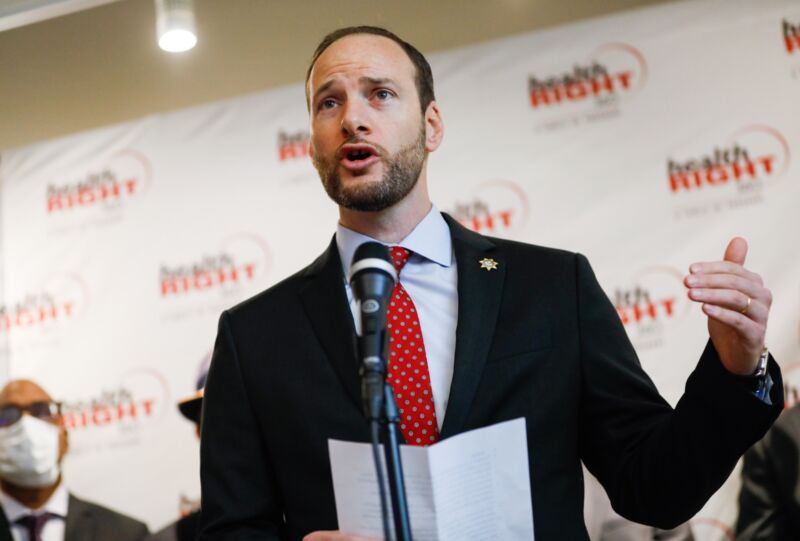
The San Francisco Police Department’s crime lab has been checking DNA collected from sexual assault victims to determine whether any of the victims committed a crime, according to District Attorney Chesa Boudin, who called for an immediate end to the alleged practice.
“The crime lab attempts to identify crime suspects by searching a database of DNA evidence that contains DNA collected from rape and sexual assault victims,” Boudin’s office said in a press release yesterday. Boudin’s release denounced the alleged “practice of using rape and sexual assault victims’ DNA to attempt to subsequently incriminate them.”
“Boudin said his office was made aware of the purported practice last week, after a woman’s DNA collected years ago as part of a rape exam was used to link her to a recent property crime,” the San Francisco Chronicle reported yesterday. The woman “was recently arrested on suspicion of a felony property crime, with police identifying her based on the rape-kit evidence she gave as a victim, Boudin said.” That was the only example provided, and Boudin gave few details about the case to protect the woman’s privacy. But the database may include “thousands of victims’ DNA profiles, with entries over ‘many, many years,’ Boudin said,” according to the Chronicle.
“We should encourage survivors to come forward—not collect evidence to use against them in the future. This practice treats victims like evidence, not human beings. This is legally and ethically wrong,” Boudin said.
Separately, Boudin is facing a recall election in June over allegations that he hasn’t been tough enough on crime.
Police chief announces investigation
San Francisco Police Chief Bill Scott said the department will investigate and that he is “committed to ending the practice” if Boudin’s allegation is accurate. But Scott also said the suspect cited by Boudin may have been identified from a different DNA database.
“We will immediately begin reviewing our DNA collection practices and policies… Although I am informed of the possibility that the suspect in this case may have been identified through a DNA hit in a non-victim DNA database, I think the questions raised by our district attorney today are sufficiently concerning that I have asked my assistant chief for operations to work with our Investigations Bureau to thoroughly review the matter and report back to me and to our DA’s office partners,” Scott said in a statement published by KRON 4.
Scott also said, “I am informed that our existing DNA collection policies have been legally vetted and conform with state and national forensic standards,” but he noted that “there are many important principles for which the San Francisco Police Department stands that go beyond state and national standards.”
“We must never create disincentives for crime victims to cooperate with police, and if it’s true that DNA collected from a rape or sexual assault victim has been used by SFPD to identify and apprehend that person as a suspect in another crime, I’m committed to ending the practice,” Scott said.
Local lawmakers plan legislation
During examinations of people reporting sexual assaults, “biological evidence from bodily fluids, fingernail scrapings, and bite and scratch marks is collected from the victim’s body,” Boudin’s announcement explained. “The victim submits their own DNA sample in order to exclude DNA that comes from the victim, as opposed to the suspect.”
State Senator Scott Wiener (D-San Francisco) and District 9 Supervisor Hillary Ronen are planning legislation at both the state and city level to stop the alleged misuse of DNA and are both quoted in Boudin’s announcement. Wiener said that “if survivors believe their DNA may end up being used against them in the future, they’ll have one more reason not to participate in the rape kit process. That’s why I’m working with the DA’s office to address this problem through state legislation, if needed.”
Despite the plan for legislation, Boudin said the crime lab’s alleged practice may already be illegal. “If DNA from a rape kit was used without consent for purposes other than investigating the underlying rape case, it may be a violation of constitutional protections against unreasonable searches and seizures as well as California’s Victims’ Bill of Rights, Boudin said,” according to the San Francisco Chronicle article.
Women’s groups slam use of DNA
Women’s groups spoke out against the alleged use of victims’ DNA. Rape exams should not be “used to self-incriminate past survivors of sexual assault and rape,” Pamela Tate, co-executive director of Black Women Revolt Against Domestic Violence, said in Boudin’s press release. “Rape survivors do not give law enforcement a blanket waiver of their rights to not self-incriminate. This type of misrepresentation will have a chilling effect to Black women and women of color in reporting crimes of sexual assault.”
Orchid Pusey, executive director of the Asian Women’s Shelter, said, “It can be especially frightening for crime survivors who are immigrants or non-native English speakers to come forward to report a crime like domestic violence or sexual assault.”
“Using DNA evidence from a survivor’s most vulnerable moments to investigate her years later abuses trust and discourages future survivors’ reporting and participation,” she said.
https://arstechnica.com/?p=1834500

